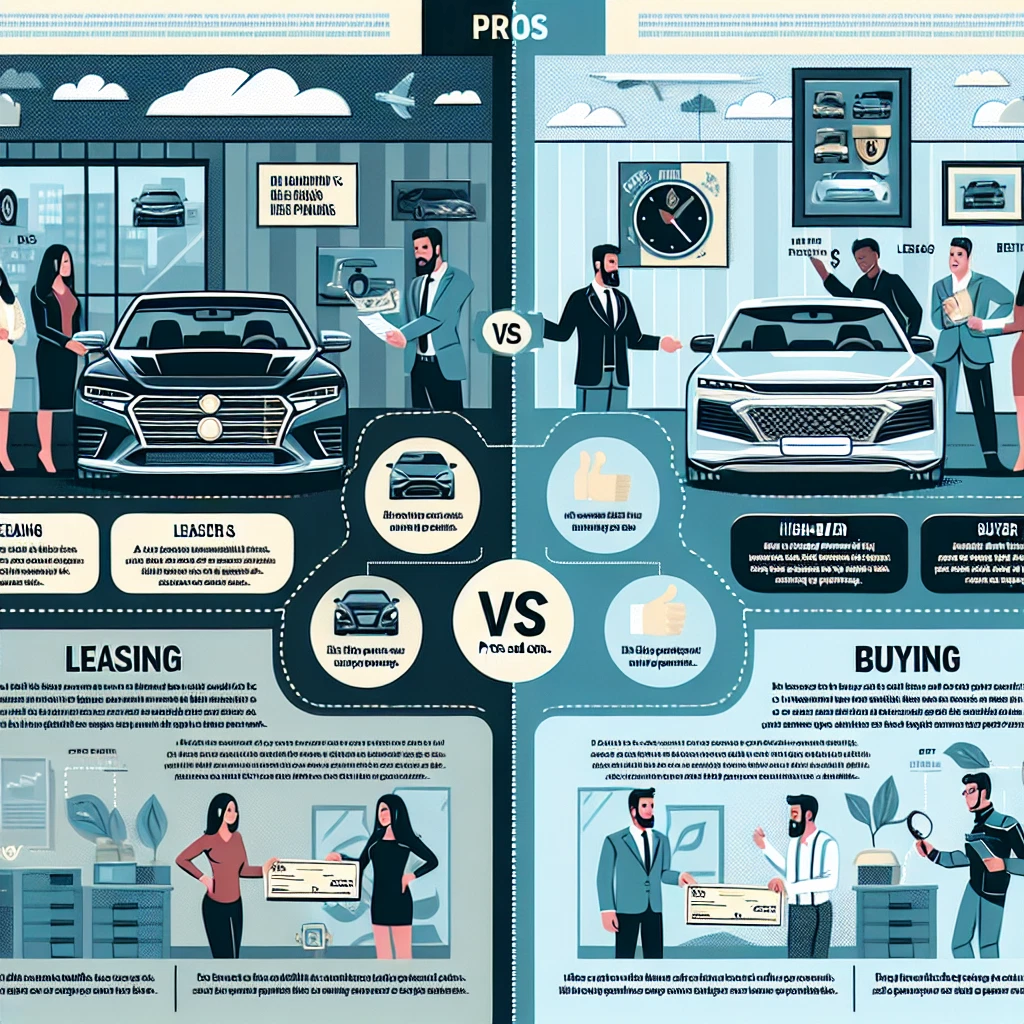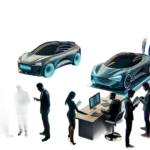
Drive in Style or Own the Road? The Ultimate Guide to High-End Car Leasing vs. Buying in 2024
Introduction
Ever dreamt of driving the latest Audi, BMW, or Tesla? If so, you’re not alone. For many car enthusiasts and luxury car owners, the dilemma of leasing versus buying a high-end car is a common one. This guide dives deep into the pros and cons of both options, offering you a road map to make the best decision for your lifestyle and financial situation. By the end of this post, you’ll be well-equipped with the knowledge to either lease your dream car or drive it off the lot for good.
Leasing Versus Buying: What’s the Difference?
Understanding the distinction between leasing and buying is crucial. When you lease a car, you’re essentially renting it for a specific period, usually between two to four years. Buying, on the other hand, involves purchasing the vehicle outright, either through full payment or financing.
Leasing often entails lower monthly payments, but it comes with mileage restrictions and potential fees for wear and tear. Buying offers the freedom to drive as much as you want and modify the car, but it generally involves higher monthly costs.
Both options have their merits and drawbacks, and the best choice varies depending on individual needs and priorities.
Financial Considerations
One of the first things to consider is the financial aspect. Leasing a high-end car typically requires a lower down payment and lower monthly payments compared to buying. This makes it easier to drive a luxury vehicle without a significant upfront investment.
However, at the end of a lease, you won’t own the car. If you choose to buy, each payment goes towards owning the vehicle outright. Over time, this can be more cost-effective if you plan to keep the car for many years.
Interest rates, depreciation, and potential resale value should also factor into your decision. For example, luxury cars often depreciate quickly, which can affect resale value if you decide to buy.
Depreciation and Resale Value
Depreciation is a significant factor when considering buying a high-end vehicle. Luxury cars can lose a considerable portion of their value within the first few years. This is a crucial consideration for buyers who may want to sell the car in the future.
Leasing mitigates this issue as the car’s residual value is predetermined at the end of the lease term. You’re only paying for the depreciation that occurs during the lease period. This means you don’t have to worry about the car’s long-term depreciation.
However, if you decide to buy, it’s essential to research which luxury brands and models hold their value better over time. Brands like Porsche and Tesla often retain value better than others.
Maintenance and Repairs
High-end cars come with high-end maintenance and repair costs. When leasing, many of these costs are covered under the vehicle’s warranty. This can save you money on routine maintenance and unexpected repairs.
Buying a luxury car means you’re responsible for all maintenance and repair costs once the warranty expires. This can add up quickly, especially for high-performance vehicles with specialized parts.
Extended warranties and maintenance packages are available for buyers, but it’s essential to factor these costs into your overall budget.
Customization and Modifications
For car enthusiasts who love to customize and modify their vehicles, buying is usually the better option. Leasing agreements often prohibit modifications, and any changes must be reversed before returning the car.
Owning a car gives you the freedom to personalize it to your heart’s content. Whether it’s upgrading the sound system, changing the exhaust, or adding performance enhancements, buying allows for greater flexibility.
If customization is a top priority for you, buying will likely be the more satisfying choice.
Flexibility and Commitment
Leasing offers more flexibility for those who like to drive the latest models. With shorter terms, you can upgrade to a new car every few years. This is perfect for tech enthusiasts who want the latest features and advancements.
Buying, however, is a long-term commitment. While it offers stability and ownership, it doesn’t provide the same level of flexibility as leasing. If you prefer to change cars frequently, leasing may be more appealing.
Additionally, getting out of a lease early can be costly, whereas selling a car gives you more control over the timing and financial outcome.
Insurance Costs
Insurance costs for high-end cars can be significant. Leases often require higher coverage levels, including gap insurance, which covers the difference between the car’s value and what you owe in case of a total loss.
Buying allows more flexibility in choosing your insurance coverage. While you still need comprehensive coverage, you can tailor your policy to fit your needs and budget.
It’s essential to compare insurance rates for both leasing and buying to determine the most cost-effective option for you.
Tax Implications
Tax implications can also influence your decision. Leasing payments might be deductible as a business expense if you use the car for work, making it an attractive option for business owners.
Purchasing a car can offer tax benefits as well, particularly through depreciation write-offs. It’s advisable to consult with a financial advisor to understand the tax advantages specific to your situation.
Understanding the tax implications can ultimately save you money and influence your decision between leasing and buying.
Environmental Impact
In today’s eco-conscious world, the environmental impact of your car choice is worth considering. Electric and hybrid luxury vehicles are becoming more popular, and leasing can provide an opportunity to drive the latest green technology.
Buying an environmentally friendly car means committing to it long-term, which can be a significant step towards reducing your carbon footprint. However, technology is rapidly advancing, and newer models with better efficiency are released frequently.
Leasing allows you to stay at the forefront of green technology without the long-term commitment.
Lifestyle and Usage
Your lifestyle and usage patterns play a significant role in the decision-making process. If you have a long daily commute or enjoy road trips, buying might be more economical in the long run.
Leasing comes with mileage limits, typically around 10,000 to 15,000 miles per year. Exceeding these limits can result in costly fees. Buyers, however, have no such restrictions and can drive as much as they want.
Consider how you plan to use the car and whether leasing’s mileage limits align with your driving habits.
Brand Loyalty and Dealer Incentives
Brand loyalty can also impact your decision. Car manufacturers often offer incentives for returning lessees, making it easier to lease a new model from the same brand.
Dealerships may provide special financing rates, cash rebates, or loyalty discounts for both leasing and buying. These incentives can significantly reduce the overall cost and make one option more attractive than the other.
Researching dealer incentives and brand loyalty programs can help you get the best deal possible.
Making the Final Decision
Ultimately, the choice between leasing and buying a high-end car depends on your unique circumstances and priorities. Both options have their benefits and drawbacks, and understanding these can help you make an informed decision.
Consider your financial situation, driving habits, and long-term goals. Whether you prefer the flexibility of leasing or the stability of ownership, there’s no one-size-fits-all answer.
Consulting with a financial advisor or car expert can provide additional insights tailored to your needs.
Conclusion
Leasing versus buying a high-end car is a decision that involves many factors, from financial considerations to lifestyle preferences. By understanding the differences and evaluating your personal needs, you can make a choice that aligns with your goals and enhances your driving experience.
For those ready to take the next step, consider booking a consultation with one of our car experts. They’ll help you explore your options and find the perfect luxury vehicle to fit your lifestyle.
Drive the car of your dreams today and experience the luxury, performance, and innovation that high-end cars have to offer.

